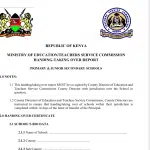Top Tips for Finding Scholarships in Kenya: A Complete Guide
Tips for Finding Scholarships in Kenya: A Complete Guide
Contents
- 1 Tips for Finding Scholarships in Kenya: A Complete Guide
- 2 1. Start Your Search Early
- 3 2. Use Official Websites and Portals
- 4 3. Explore Local Government and County Bursaries
- 5 4. Take Advantage of University-Based Scholarships
- 6 5. Network and Ask Around
- 7 6. Prepare Strong Supporting Documents
- 8 7. Apply to Multiple Scholarships
- 9 8. Perfect Your Personal Statement
- 10 9. Beware of Scams
- 11 10. Stay Persistent and Positive
- 12 Final Thoughts on Tips for Finding Scholarships in Kenya
Pursuing higher education in Kenya can be expensive, but scholarships make it possible for many students to achieve their academic dreams. From government-funded opportunities to private organizations and international programs, there are plenty of scholarships in Kenya available for both undergraduate and postgraduate students. The challenge, however, lies in knowing where and how to find them.
In this guide, we will share practical tips for finding scholarships in Kenya, how to apply, and strategies to increase your chances of success.
1. Start Your Search Early
One of the most important tips for finding scholarships is to start your search early. Many scholarship programs in Kenya open applications months before the academic year begins. By beginning early, you will:
- Have enough time to gather required documents.
- Avoid rushing through the application process.
- Increase your chances of meeting strict deadlines.
Early preparation also allows you to apply for multiple scholarships, improving your chances of securing financial aid.
2. Use Official Websites and Portals
There are many scams targeting desperate students, so it’s important to rely on trusted sources. Some key websites to check include:
- HELB (Higher Education Loans Board) – www.helb.co.ke for government scholarships and bursaries.
- University Websites – Many Kenyan universities offer internal scholarships for needy and bright students.
- Government and Ministry Websites – Updates on county scholarships, CDF bursaries, and state-sponsored awards.
- NGO and Corporate Websites – Organizations such as Equity Bank, Safaricom Foundation, and Mastercard Foundation regularly offer scholarships.
3. Explore Local Government and County Bursaries
Most counties in Kenya have county government scholarships and bursaries for residents. These opportunities are often less competitive than national scholarships since they target smaller populations. Visit your County Education Office or check county websites for application guidelines.
4. Take Advantage of University-Based Scholarships
If you are already admitted to a university or college, check with the financial aid office for internal scholarship opportunities. Many institutions, including the University of Nairobi, Kenyatta University, Strathmore University, and Daystar University, offer scholarships for students who excel academically or show financial need.
5. Network and Ask Around
Sometimes, the best scholarships are not widely advertised. Talk to lecturers, education officials, church leaders, or alumni who might know of scholarship opportunities. Joining online student forums and social media groups focused on education can also expose you to hidden opportunities.
6. Prepare Strong Supporting Documents
Most scholarship applications require documents such as:
- Academic transcripts and certificates.
- Admission letters.
- Identification documents (ID, birth certificate).
- Recommendation letters.
- A personal statement or essay.
Keep updated and well-organized files so you can quickly apply whenever a scholarship opens.
7. Apply to Multiple Scholarships
Don’t rely on just one scholarship opportunity. Apply to as many as you qualify for. Even small bursaries can help cover costs like books, accommodation, or tuition balances. The more applications you send, the higher your chances of securing funding.
8. Perfect Your Personal Statement
Most scholarships require you to write an essay or personal statement explaining why you deserve the award. Make sure your statement:
- Clearly demonstrates financial need.
- Highlights your academic achievements.
- Shows your long-term goals and how the scholarship will help you achieve them.
- Is honest, well-structured, and free from grammatical errors.
9. Beware of Scams
Unfortunately, many fake organizations prey on students searching for scholarships. Always verify opportunities before applying. Genuine scholarships do not ask for application fees. If you are unsure, consult your university or local education office before submitting personal information.
10. Stay Persistent and Positive
Scholarship applications are competitive, and rejection is normal. Don’t give up if you miss one opportunity. Stay persistent, continue improving your grades, strengthen your personal statements, and keep applying. With determination, you’ll eventually secure funding.
Final Thoughts on Tips for Finding Scholarships in Kenya
Finding scholarships in Kenya requires effort, consistency, and strategy. Start early, use official portals, prepare your documents, and apply widely. Scholarships can transform your education journey and open doors to opportunities you never imagined. Remember, persistence pays off — the more you search and apply, the higher your chances of success.
scholarships in Kenya, tips for finding scholarships in Kenya, how to apply for scholarships in Kenya, county bursaries, HELB scholarships, university scholarships Kenya.





